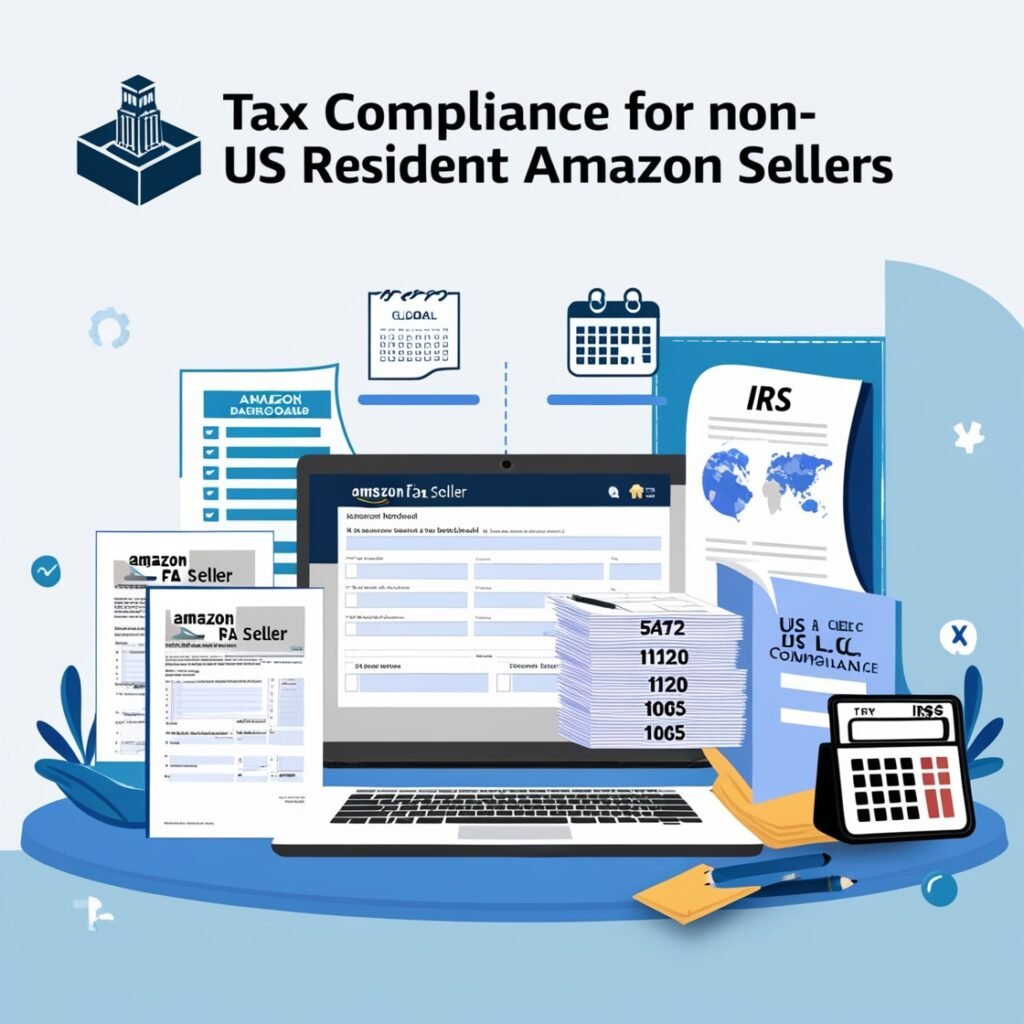Tax Compliance for Non-US Amazon Sellers

Tax Compliance for Non-US Amazon Sellers
Amazon FBA (Fulfillment by Amazon) offers a lucrative platform for international entrepreneurs to tap into the expansive US market. For non-resident sellers, establishing a US Limited Liability Company (LLC) can streamline operations and increase credibility. However, navigating the US tax system can be complex and daunting. This guide will shed light on the tax compliance requirements for non-resident Amazon FBA sellers operating through a US LLC.
Understanding the Basics: What is an LLC?
A Limited Liability Company (LLC) is a flexible business structure in the United States that protects its owners’ personal assets from business liabilities. It combines features of both corporations and partnerships, offering both limited liability protection and pass-through taxation.
Read more about different types of LLC and choosing best one
Taxation of Foreign-Owned US LLCs
For non-us amazon sellers, it is vital to understand the tax obligations associated with operating an LLC in the US. If you own an LLC without any US-based members, the LLC is generally required to file certain forms with the International Revenue Service (IRS). Here are the key tax forms and requirements:
Form 5472
Foreign-owned single-member LLCs are treated by default as disregarded entities for US tax purposes. As a result, these LLCs must file Form 5472, which provides information about the foreign owner and the transactions between the LLC and its owner. The failure to file this form can result in hefty penalties.
Learn more information on Form 5472.
Form 1120
Non-us resident owned LLCs that check the box to be treated as a corporation must file Form 1120 (US Corporation Income Tax Return). This form reports the income, profits, losses, deductions, and credits of the corporation. Although this is less common for small sellers, it is an option to consider under specific circumstances.
Learn more about corporate tax obligations
Form 1065
When an LLC has multiple members, it is treated as a partnership by default and must file Form 1065 (US Return of Partnership Income). This form provides information on the LLC’s income, deductions, gains, and losses. Each member will also receive a Schedule K-1, detailing their share of the partnership’s income, which they must report on their personal tax returns.
For personalized tax planning services, book an appointment with a tax expert
State Tax Requirements
Establishing an LLC in the US will also require you to comply with state tax laws. Each state has different requirements, but here are some common elements:
- State Sales Tax: If your LLC sells tangible personal property, you might be responsible for collecting and remitting sales tax to the state where your customers are located. Several states have thresholds for economic nexus, meaning sellers must collect sales tax if they exceed a certain level of sales in the state.
- Franchise Tax: Some states impose a franchise tax on LLCs for the privilege of doing business in that state. This can be a flat fee or based on the LLC’s income or capital.
- State Income Tax: Depending on the state, your LLC might have to file a state income tax return.
Withholding Tax on US-Sourced Income
Non-US amazon sellers might be subject to withholding tax on income sourced from the US. This typically includes income effectively connected with a US trade or business, such as proceeds from sales through the Amazon FBA program. The standard withholding tax rate is 30%, without the benefits of a tax treaty.
Tax Treaties
The United States has tax treaties with various countries to prevent double taxation and reduce tax rates on certain types of income. Familiarizing yourself with the tax treaty between the US and your home country can potentially reduce your tax obligations.
Explore the list of US tax treaties on the IRS website
Utilizing Existing Treaties to Lower Withholding Rates
If your home country has a tax treaty with the US, you may qualify for a reduced withholding rate on certain types of income. To avail of these benefits, you must provide the IRS with Form W-8BEN (Certificate of Foreign Status of Beneficial Owner for United States Tax Withholding).
Filing Deadlines
Staying compliant with tax obligations means meeting all pertinent deadlines:
- Form 5472: Due by April 15th of the following year.
- Form 1065: Due by March 15th of the following year.
- Form 1120: Due by April 15th of the following year.
Late filing or non-compliance can result in significant penalties and interest. It’s crucial to keep track of these dates to avoid financial repercussions.
Missed a deadline? Contact today handle late tax filings.
Tips for Simplifying Tax Compliance
- Hire a Tax Professional: Working with a tax professional who understands the intricacies of US tax law can be invaluable. They can ensure you file correctly and on time.
- Use Accounting Software: Utilize accounting software to track your sales, expenses, and other financial activities.
- Keep Thorough Records: Maintain accurate and detailed records of all transactions, expenses, and deductions to simplify the tax filing process.
Conclusion
Complying with US tax laws is a critical aspect of operating a successful Amazon FBA business. Understanding your responsibilities can save you from penalties and financial strain. Establishing a US LLC as a non-resident seller has its tax complexities, but with diligent planning and appropriate expertise, you can navigate these challenges efficiently. By staying informed and proactive, you can focus more on growing your business while remaining compliant with US tax regulations.
If you’re ready to ensure your Amazon FBA business stays compliant, schedule a free consultation call with our tax experts today



